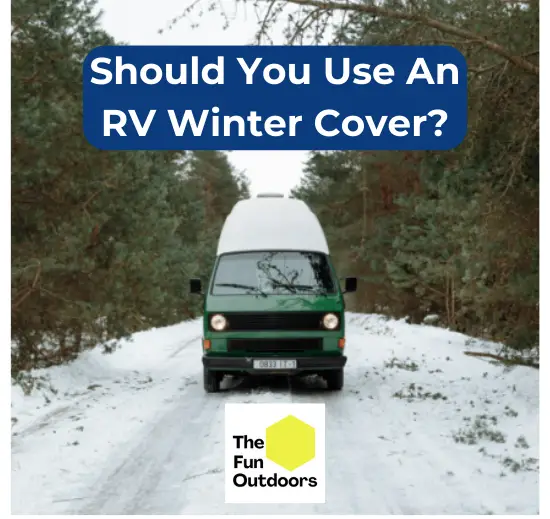If you own an RV, you may be wondering whether or not to cover it during the winter months. There are pros and cons to both covering and not covering your RV, and ultimately the decision comes down to your personal preferences and circumstances.
If you’re storing your RV for an extended period of time, a cover may be a good investment to protect your vehicle from the elements. A waterproof cover can keep rain, snow, and ice from seeping into your RV and causing damage. This can be especially important if you live in an area with harsh winter weather. If you plan to use your RV during the winter months, covering it may not be practical.
Ultimately, the decision to cover your RV during the winter is up to you, and depends on your individual needs and preferences. We’ll go over everything in depth in this guide.
Should You Cover Your RV In The Winter?
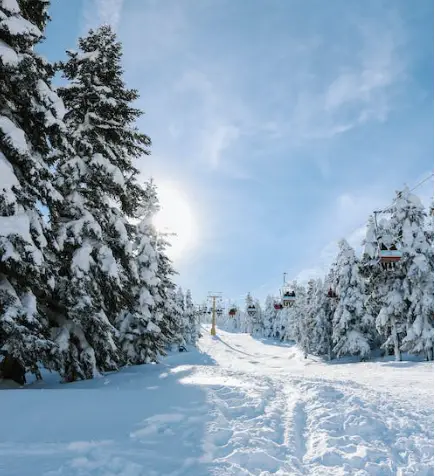
As a responsible RV owner, it’s important to protect your investment from the harsh winter elements. But should you cover your RV in the winter? Let’s explore the pros and cons.
Pros
- Protection from the elements: Covering your RV during the winter can protect it from snow, ice, and wind damage. This can help prevent leaks, fading, and cracking.
- Cost-effective: Investing in a quality RV cover can be a cost-effective way to protect your RV from the elements. It’s much cheaper than renting covered storage space or building a shelter.
- Reduced maintenance: Covering your RV can also reduce the need for frequent washings, waxings, and roof treatments. This can save you time and money in the long run.
Cons
- Inconvenient setup: Covering your RV can be time-consuming and inconvenient, especially if you have a larger RV. You’ll need to make sure the cover is properly secured to prevent damage from wind.
- Cheap covers aren’t worth it: Cheap covers can be more trouble than they’re worth. They may not fit properly, which can cause damage to your RV’s exterior. It’s important to invest in a quality cover that fits your RV properly.
- Not all RVs are easily covered: Some RVs, especially larger ones, may not be easily covered. You’ll need to make sure you choose a cover that fits your RV properly.
Will An RV Cover Damage My RV?
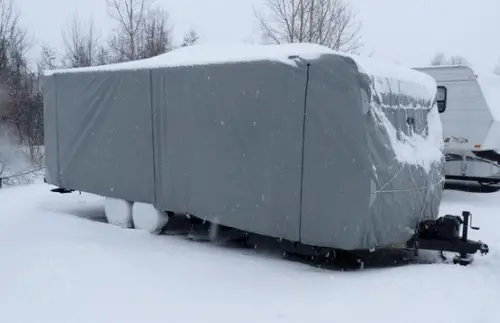
Covering your RV during the winter months is an excellent way to protect it from the harsh weather conditions. Some RV owners are concerned that using a cover might cause damage to their RV. Let’s address this concern and provide you with the information you need to make an informed decision.
First and foremost, it’s essential to use a cover that is specifically designed for your RV. An ill-fitting cover can cause problems such as moisture buildup, which can lead to mold and mildew growth. It can also allow pests to enter your RV, causing damage that you will have to fix come spring. Make sure to choose a cover that fits snugly and is designed for your RV’s size and shape.
Another thing to keep in mind is that you should always clean and dry your RV before covering it. Any dirt or moisture left on the RV can cause damage over time. If you cover a dirty RV, the cover can rub against the surface, causing scratches and abrasions. Similarly, if you cover a wet RV, moisture can get trapped between the cover and the RV, leading to mold and mildew growth.
Additionally, poorly fitted covers can cause damage to your RV in windy conditions. The cover can flap in the wind and rub against the RV’s exterior, causing damage to both the RV and the cover. Choose a cover that fits snugly and is designed to withstand windy conditions.
See Related: How to get rid of mold in an RV
Choosing the Right RV Cover
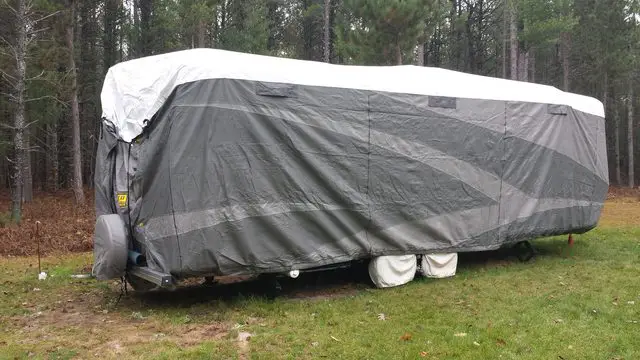
When it comes to choosing an RV cover, there are a few things to consider to ensure you get the right one for your needs. Here are some factors to keep in mind:
Material
RV covers are typically made of one of three materials: polypropylene, polyester, or polyethylene. Polypropylene is the most affordable option, but it is not as durable as the other two materials. Polyester is more durable than polypropylene and offers better protection against UV rays. Polyethylene is the most durable and provides the best protection against moisture.
Size
It’s important to choose a cover that fits your RV properly. A cover that is too small will not provide adequate protection, while a cover that is too large can be difficult to secure properly. Make sure to measure your RV carefully before buying a cover.
Quality
Investing in a high-quality cover can save you money in the long run. A high-quality cover will last longer and provide better protection than a cheaper, lower-quality option.
Buying an RV Cover
When shopping for an RV cover, it’s important to do your research and read reviews from other RV owners. Look for a cover that has a good reputation for durability and protection.
Additional Features
Some RV covers come with additional features, such as vents to prevent moisture buildup, zippered access panels for easy entry, and reinforced corners for added durability. Consider which features are important to you when choosing a cover.
Overall, choosing the right RV cover is an important decision to help protect your investment. Consider the material, size, quality, and additional features when making your choice.
Benefits of Using a Cover
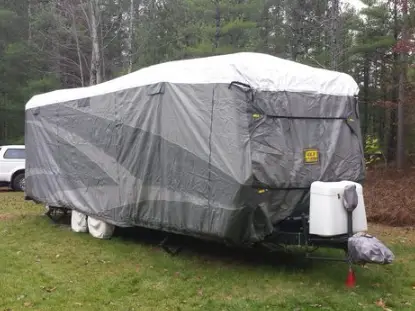
Covering your RV during winter months can provide a variety of benefits. Here are some of the advantages of using an RV cover:
- Protection from Weather Elements: An RV cover can protect your vehicle from harsh weather conditions such as snow, rain, hail, and wind. This can help prevent damage to the exterior and interior of your RV, as well as protect seals and paint from being damaged by moisture.
- Protection from UV Rays: A high-quality RV cover can also protect your vehicle from harmful UV rays that can cause fading and damage to the exterior of your RV. This can help preserve the resale value of your RV over time.
- Lower RV Storage Costs: By covering your RV during the winter months, you can reduce the need for expensive indoor RV storage. This can save you money on storage costs and help protect your RV from the elements at the same time.
- Less Maintenance Required: When you cover your RV during the winter, you’ll have less maintenance work to do when you uncover it in the spring. Your RV will be cleaner, and you won’t have to worry about removing snow, ice, or debris that may have accumulated on the exterior.
See Related: How To Dewinterize Your RV
- Protection for Tires: A good RV cover can also protect your tires from the elements, helping to prevent dry rot and other types of damage.
See Related: How Long Do RV Tires Last? and How To Prevent RV Tire Dry Rot
- Preserve Components: Covering your RV can help protect the components of your vehicle, such as vents and other openings, from damage caused by moisture, debris, and pests.
- Improved Security: Covering your RV can also provide an added layer of security, as it can help deter thieves and vandals from targeting your vehicle.
Drawbacks of RV Covers
While RV covers have numerous benefits, they also come with some drawbacks that you should consider before making a decision. Here are some of the most significant drawbacks of RV covers:
Expensive
One of the most significant drawbacks of RV covers is that they can be quite expensive. High-quality RV covers can cost several hundred dollars, and custom covers can be even more expensive. While investing in a high-quality cover can help protect your RV from the elements and extend its lifespan, it’s important to consider whether the cost is worth it for your specific situation.
Hard to Put On and Take Off
Another drawback of RV covers is that they can be challenging to put on and take off, especially if you have a larger RV. This can be a frustrating and time-consuming process, especially if you need to remove the cover frequently to use your RV. Additionally, if you don’t put the cover on correctly, it can cause damage to your RV, defeating the purpose of using a cover in the first place.
Can Trap Moisture
While RV covers are designed to protect your RV from the elements, they can also trap moisture inside, leading to mold, mildew, and rust. This is especially true if you live in a humid climate or if you don’t properly ventilate your RV before covering it. To prevent moisture buildup, make sure to thoroughly dry your RV before covering it and consider using desiccant packets or other moisture-absorbing products inside your RV.
May Not Fit Properly
Finally, RV covers may not fit properly on your RV, especially if you have an unusual or custom-sized RV. This can cause gaps in the cover, allowing the elements to damage your RV. Additionally, if the cover is too tight, it can cause stress on your RV’s seams and zippers, leading to damage over time. Before purchasing an RV cover, make sure to measure your RV carefully and choose a cover that is designed to fit your specific model.
Overall, while RV covers have some drawbacks, they can still be a worthwhile investment for many RV owners. By carefully considering the benefits and drawbacks and choosing a high-quality cover that fits your RV correctly, you can help protect your RV and extend its lifespan.
Should You Cover Your RV With A Tarp?
When it comes to protecting your RV during winter, covering it with a tarp is a popular option. However, it’s important to consider the pros and cons before making a decision.
Pros of Covering Your RV With a Tarp
- Protection from the elements: A tarp can protect your RV from snow, rain, and other harsh weather conditions that can cause damage.
- UV protection: A high-quality tarp can also protect your RV from harmful UV rays, which can fade the exterior and damage the interior.
- Cost-effective: A tarp is generally more affordable than a custom RV cover or storing your RV in a garage.
Cons of Covering Your RV With a Tarp
- Moisture buildup: If the tarp is not breathable, it can trap moisture and lead to mold and mildew growth.
- Scratches and damage: A tarp that is not secured properly can cause scratches and damage to the RV’s exterior. Also, the grommets can make micro-scratches in your RV’s exterior.
- Pest attraction: A tarp can also attract pests, such as rodents and insects, who may seek shelter under the cover.
If you do decide to cover your RV with a tarp, it’s important to choose a high-quality, breathable tarp that fits your RV properly. Look for a tarp with reinforced grommets and tie-downs to ensure a secure fit.
Also make sure to remove any debris from the RV’s exterior before covering it to avoid scratches and damage.
Alternatives to RV Covers
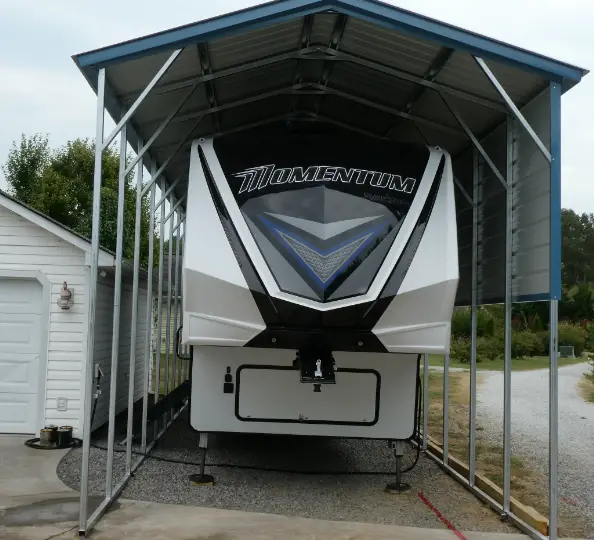
If you’re not interested in using an RV cover, there are a few alternatives you can consider to protect your RV during the winter.
Indoor Storage
Indoor storage is one of the best ways to protect your RV from the harsh winter weather. Storing your RV indoors will keep it safe from snow, ice, and other elements that can cause damage. However, indoor storage can be expensive, and not everyone has access to a suitable storage facility.
Tarps
Tarps can be a cheaper alternative to RV covers, but they can be difficult to keep in place and may not provide adequate protection. If you do decide to use a tarp, make sure it is securely tied down and covers the entire RV. Blue tarps are not recommended, as they are not as durable as other types of tarps and can deteriorate quickly.
Other Options
If you don’t want to use an RV cover or a tarp, there are a few other options you can consider. For example, you can use tire covers to protect your RV’s tires from the elements. You can also use a dehumidifier to prevent moisture buildup inside your RV during the winter months.
Ultimately, the best option for protecting your RV during the winter will depend on your budget, your storage options, and your specific needs. Consider all of your options carefully before making a decision.
Extra RV Winter Storage Tips
When storing your RV for the winter, there are a few extra steps you can take to ensure it stays in great condition and is ready to go when spring arrives. Here are some tips to consider:
- Drain the Water System: To prevent water from freezing and damaging your RV’s plumbing system, make sure to drain all the water from the pipes, tanks, and water heater. Use RV antifreeze to protect the pipes and valves.
- Prep the Exterior: Before storing your RV, give it a thorough cleaning, including the roof, awnings, and undercarriage. Apply a protective wax or sealant to the exterior to prevent damage from snow, ice, and other winter elements.
- Choose a Safe Location: When selecting a storage location for your RV, choose a spot that is protected from the elements and secure from theft or vandalism. If you’re storing your RV outside, consider using a cover to protect it from snow and ice.
- Protect RV Tires: When storing your RV for an extended period, it’s important to take care of the tires. Inflate them to the recommended pressure and cover them to protect them from UV rays and other elements.
- Disconnect RV Batteries: To prevent the RV batteries from draining over the winter, disconnect them or use a battery tender to keep them charged.
- Add Fuel Stabilizer: Before storing your RV, add a fuel stabilizer to the gas tank to prevent the fuel from breaking down and causing problems when you start it up in the spring.
- Protect from Bugs and Rodents: To prevent pests from making a home in your RV over the winter, make sure to seal up any openings and use pest repellents or traps.
- Check Your RV Periodically: Even when your RV is in storage, it’s important to check on it periodically to make sure everything is in good condition. Check for any signs of damage or leaks and make any necessary repairs before they become bigger problems.
By following these extra RV winter storage tips, you can help ensure that your RV stays in great condition and is ready to hit the road when spring arrives.

